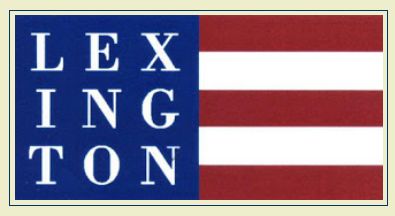The U.S District Court for the Southern District of New York denied Plaintiff LFI's motion for summary judgment in this action for trademark infringement involving Defendant's use of the mark LEXINGTON for home textiles. A decade ago, LFI succeeded in a TTAB proceeding for cancellation of Defendant's registration for the mark shown below, for household linens. (TTABlogged here). Defendant filed a cross-motion for summary judgment on the infringement issue, which motion was also denied. Lexington Furniture Industries, Inc. v. The Lexington Company, AB, Civil Action No. 19-cv-6239 (PKC) (SDNY March 23, 2010).

Issue Preclusion: Plaintiff LFI argued that issue preclusion should bar Defendant from litigating whether its mark is likely to cause confusion, since the Board found that "because the marks are similar, the goods are related and the goods move in the same channels of trade and are sold to the same classes of consumers, [LCC's] mark LEXINGTON and design for household linens so resembles [LFI's] LEXINGTON marks for furniture as to be likely to cause confusion."
The Second Circuit observed that:
As a general matter, issue preclusion "applies when (1) the issues in both proceedings are identical, (2) the issue in the prior proceeding was actually litigated and actually
decided, (3) there was a full and fair opportunity for litigation in the prior proceeding, and (4) the issues previously litigated were necessary to support a valid and final judgment on the merits.
The Supreme Court, in B&B Hardware, Inc. v. Hargis
Indus., Inc. [TTABlogged here], addressed the issue of the
preclusive effect of a TTAB decision in a subsequent action for
trademark infringement: "[s]o long as the other ordinary
elements of issue preclusion are met, when the usages adjudicated
by the TTAB are materially the same as those before the district
court, issue preclusion should apply."
Id. at 160. However, "if the TTAB
does not consider the marketplace usage of the parties' marks,
the TTAB's decision should 'have no later preclusive effect
in a suit where actual usage in the marketplace is the paramount
issue.'" Id. at 156-57 (quoting McCarthy on
Trademarks and Unfair Competition § 32:101).
The district court wisely concluded that issue preclusion does not apply here because, at the time of the TTAB's decision, defendant had not yet entered the U.S. market. [Defendant's registration issued under Section 66(a) of the Lanham Act, not Section 1(a))].
Therefore, all of the marketplace usage at issue here occurred after the TTAB's decision. *** [W]hether there is a likelihood of confusion in this action depends considerably on the actual marketplace usage of both LFI's and LCC's marks. With respect to the factor of similarity between the two marks, the Court considers the context in which the marks are used.
In this civil action, Plaintriff LFI relies in part on Defendant's use of its "Lexington" mark on its social media and its website, in advertisements and on product, but none of these uses were considered by the TTAB. Also, Defendant points out that, in the marketplace, LFI using its "Lexington" marks in conjunction with a brand or collection name. Furthermore, the actual channels of trade may differ.
[A] reasonable jury could find that the factor of actual
confusion in the marketplace weighs
in favor of LFI or LCC. Because the issues in this case turn on
actual marketplace usage not
considered by the TTAB, issue preclusion does not
apply. See B&B Hardware, 575 U.S. at 154
("[F]or a great many registration decisions issue preclusion
obviously will not apply because the ordinary elements will not be
met.").
Denial of the
Cross-motions: Running through the
Second Circuit's Polaroid factors,
the district court explained that three of the factors - (1)
strength of mark (2) similarity of the marks and (3)
competitive
proximity - involve triable issues of fact. And so the Board
denied the summary judgment motions.
The content of this article is intended to provide a general guide to the subject matter. Specialist advice should be sought about your specific circumstances.
